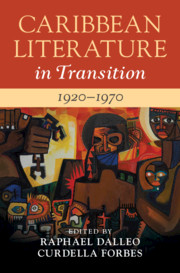Book contents
- Caribbean Literature in Transition, 1920–1970
- Caribbean Literature in Transition
- Caribbean Literature in Transition, 1920–1970
- Copyright page
- Contents
- Figure
- Contributors
- Introduction
- Part I Literary and Generic Transitions
- Part II Cultural and Political Transitions
- Chapter 7 Debating Language
- Chapter 8 Periodical Culture
- Chapter 9 Decolonizing Education
- Chapter 10 Imaginaries of Citizenship and State
- Chapter 11 Postcolonial Stirrings
- Part III The Caribbean Region in Transition
- Part IV Critical Transitions
- Bibliography
- Index
Chapter 9 - Decolonizing Education
Literature, the School System, and the Imperatives of Political Independence
from Part II - Cultural and Political Transitions
Published online by Cambridge University Press: 16 December 2020
- Caribbean Literature in Transition, 1920–1970
- Caribbean Literature in Transition
- Caribbean Literature in Transition, 1920–1970
- Copyright page
- Contents
- Figure
- Contributors
- Introduction
- Part I Literary and Generic Transitions
- Part II Cultural and Political Transitions
- Chapter 7 Debating Language
- Chapter 8 Periodical Culture
- Chapter 9 Decolonizing Education
- Chapter 10 Imaginaries of Citizenship and State
- Chapter 11 Postcolonial Stirrings
- Part III The Caribbean Region in Transition
- Part IV Critical Transitions
- Bibliography
- Index
Summary
Writers of the 1920s–1970s were concerned with education beyond the excoriating critique of the formal colonial school system that we see in many of their works. For them, education in the broadest sense was crucial to the decolonial project, and literature an activist intervention in that project. Lamming and Brathwaite as well as C. L. R James wrote ‘position’ statements on education and were interventionists in the formal school system. However, for most of the period, West Indian literature made little impact within that system, which continued as colonialism’s strongest bastion well after independence. The literature had its greatest impact when it was channelled through popular performance arenas, trade unions, newspapers, the ‘little magazines’ and other institutions outside the school setting. This chapter discusses the slow painful steps towards decolonizing literary education through shifts in publishing and curricula, the advent of regional examinations, and the work of critics and linguists to decolonize attitudes towards the Creole languages, one of the most powerful dissemination tools.
Keywords
- Type
- Chapter
- Information
- Caribbean Literature in Transition, 1920–1970 , pp. 145 - 161Publisher: Cambridge University PressPrint publication year: 2021

